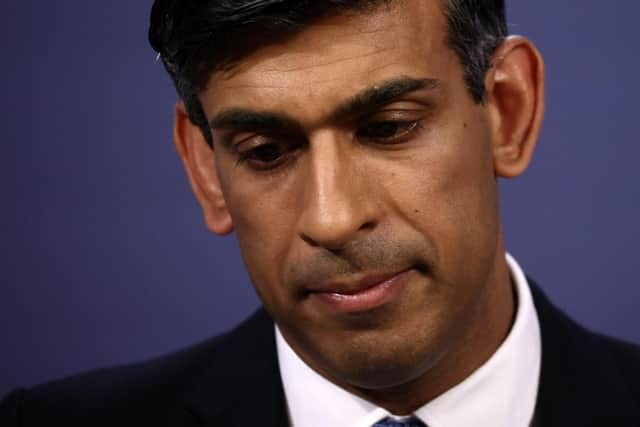China spy report: UK response to Chinese intelligence threat 'completely inadequate' amid 'aggressive' attacks
A new and wide-ranging report by the Intelligence and Security Committee (ISC) is critical of the UK Government’s response to the threat posed by China, questioning the trade-off between economic interest and security concerns.
It also raises concerns about Chinese influence in UK universities and the country’s intention to become a “permanent and significant player” in the civil nuclear energy industry.
Advertisement
Hide AdAdvertisement
Hide AdMPs said the 200-page report should be a “wake-up” call for ministers, as the ISC warned that Chinese targeting of industry and technology could pose an “existential threat to liberal democratic systems”.


The report found the UK remains of “significant interest to China when it comes to espionage and interference”, placing the country “just below China’s top priority targets”.
The document said: “China’s state intelligence apparatus – almost certainly the largest in the world with hundreds of thousands of civil intelligence officers … targets the UK and its interests prolifically and aggressively, and presents a challenge for our agencies to cover.”
The report details pressures on Chinese students in the UK, including incidents in Scotland. In November 2019, a Chinese student was photographed in Edinburgh with a sign supporting Hong Kong citizens’ demands for free elections.
"The following day, he was secretly photographed at Edinburgh Airport while escorting his mother to her flight," the report says. "Both pictures were circulated on Weibo, the Chinese social media site, by someone who believed he was returning to Chengdu, his hometown.
"The post – entitled ‘Brothers from Chengdu, beat him to death’ – contained the flight number and a call for him to be arrested by police or assaulted by citizens. It was shared10,000 times."
The document also refers to reports the Glasgow Chinese Students and Scholars Association had promoted "flash mobs" to confront Hong Kong demonstrations.
Quoting a report in 2019, it says: "One Hong Kong student who had attended protests in Edinburgh said that 'there is Chinese embassy involvement in these demonstrations … they surrounded us in a circle, waving Chinese flags, singing the national anthem and being threatening and hostile.'"
Advertisement
Hide AdAdvertisement
Hide AdThe nine-member committee, chaired by Conservative MP Sir Julian Lewis, scrutinises the work of the UK’s intelligence agencies including MI5, MI6 and GCHQ.
Its reports are seen by the Prime Minister before release, with the latest report coming amid ongoing tensions between the West and the rising Asian power.
The Government has characterised the growing influence of China as an “epoch-defining challenge”, but MPs urged ministers and officials to consider more deeply the type of security threat it poses.
The ISC report said the UK’s resources were “completely inadequate” when it came to tackling what committee members labelled China’s “whole-of-state” approach to espionage and interference overseas.
It warned of a danger of short-term thinking and a lack of long-term planning to counter the threat posed by China.
“The UK is now playing catch-up and the whole of Government has its work cut out to understand and counter the threat from China,” the report said.
“The UK is severely handicapped by the short-termist approach currently being taken.”
In evidence to MPs, MI5 director-general Ken McCallum said: “The challenge of the rise of China absolutely raises huge questions for the future of the Western alliance.
Advertisement
Hide AdAdvertisement
Hide Ad“None of us can give a confident long-term answer to exactly how the balance of power plays out globally across the next few decades, but it is clear for all of us that this is, I think, the central intelligence challenge for us across the next decade.”
Particular concerns were raised in the report about Chinese influence in UK universities.
It is not the first time that anxiety has been expressed about Chinese control in higher education.
Rishi Sunak promised in last year’s Tory leadership race to shut down the 30 Chinese state-sponsored Confucius Institutes across the UK, including one based in Edinburgh, before back-tracking once in office.
The report said British “academic institutions provide a rich feeding ground for China to achieve political influence in the UK and economic advantage over the UK”.
It added: “In order to control the narrative of debate, China exerts influence over institutions by leveraging fees and funding, over individual UK academics through inducements and intimidation, over Chinese students by monitoring and controlling, and over think tanks through coercion.”
But MPs said the Government had shown “very little interest” in warnings from academics about the matter. The report also flagged concerns about the role China was playing in the civil nuclear energy sector.
Mr Sunak did offer an immediate response in a three-and-a-half-page statement, in which he listed measures taken to improve the UK’s response to China.
Advertisement
Hide AdAdvertisement
Hide AdThe Prime Minister also said the ISC probe began in 2019 and took most evidence in 2020 “pre-dating both the Integrated Review 2021 and the Integrated Review Refresh 2023″.
“These are both comprehensive national security and international policy reviews that considerably strengthen our position on China,” he said.
“The Government has already taken actions that are in line with many of the committee’s recommendations.”
Comments
Want to join the conversation? Please or to comment on this article.